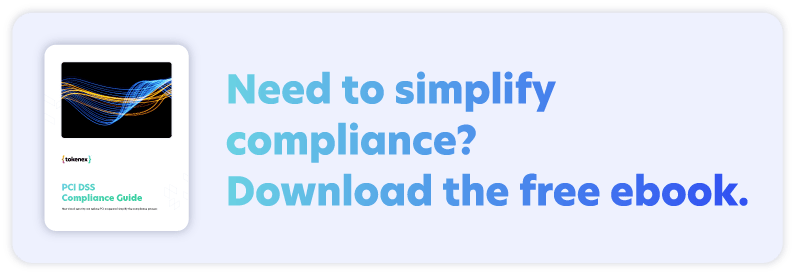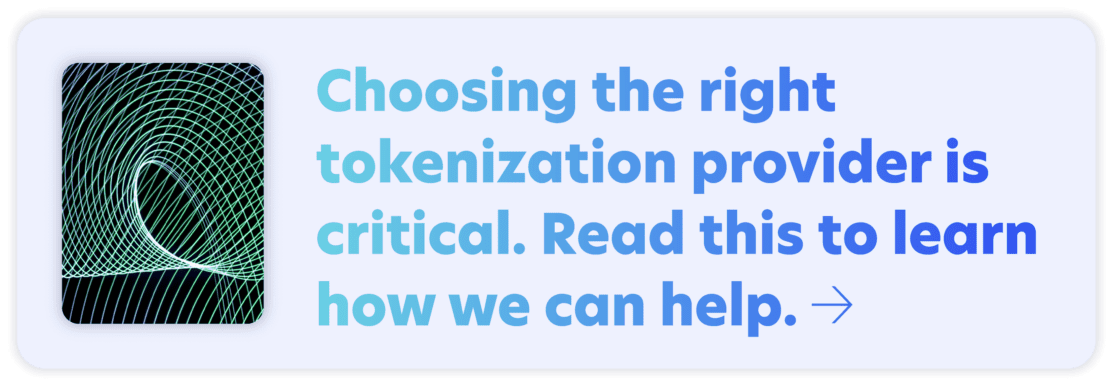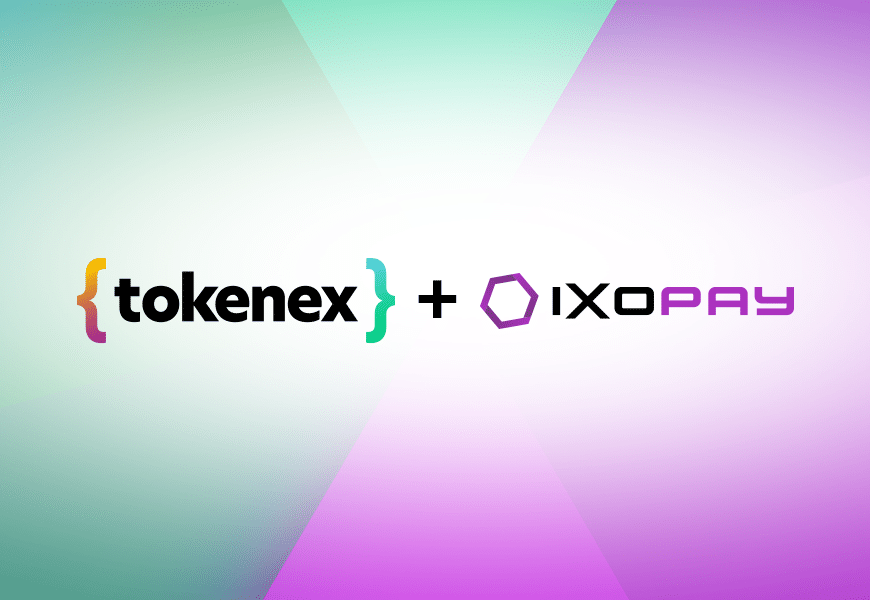Quick Hits:
- CTOs and CISOs must consider several factors when choosing a third-party tokenization provider for their company, such as data control, flexibility, PCI compliance, and risk reduction.
- Tokenization has several benefits, such as reducing data breach risks, growing customers’ trust, less red tape, and more payment innovations.
- While finding a third-party token service provider can be challenging, it can be helpful to check out case studies from various industries like POS leasing companies, payment applications, or hotel booking platforms.
What to Look for In a Third-Party Token Service Provider
In today’s digital landscape, technology is constantly changing, opening up new opportunities and risks for businesses. One of the most prevalent risks is cybercrimes like data breaches, credit card fraud, and ransomware. Hackers look for security weaknesses within organizations’ systems that can be used to steal or compromise sensitive data. If a business becomes a breach victim, this can lead to a handful of issues, such as lawsuits, huge fines, and brand reputational damage. Indeed, to combat cyberattacks, it’s recommended that chief technology officers (CTOs) and chief information security officers (CISOs) consider partnering with a reputable third-party tokenization provider. Since there are numerous options, this article will discuss critical factors when choosing a token service provider.
Data Control and Flexibility
If your business needs the flexibility to control your data and work with any third-party integration, such as payment processors or gateways, you should consider an agnostic platform. The freedom to use third-party integrations helps companies build unique, customizable solutions that fit their needs instead of the providers. This flexibility allows businesses quickly adopt technologies necessary to establish layered security strategies to protect their sensitive data.
To illustrate, one of our clients, Acima Credit, lacked the flexibility to work with any payment processor as needed. This point-of-sale leasing platform found that “we had a partner that wanted to charge us over one hundred thousand dollars to move our cards to a different processor,” according to Acima Credit VP of Engineering Ryan Christensen. “Our client soon realized that it was time to partner with a provider that gave them the freedom to vault independently and provide the ability to onboard new card processors instantaneously,” Christensen said.
By leveraging TokenEx as a proxy through which Acima could tokenize with any payment processor, our client now had the flexibility and data control needed to meet their payment security needs. This included sending transactions to TokenEx, enabling it to migrate without paying its former process to retrieve its tokens. In turn, Acima was able to save tens of thousands of dollars every year by being able to negotiate with multiple payment service providers (PSPs). Additionally, Acima was able to transition 100 percent of its transaction volume to new processors and implement Account Updater to eliminate processing failures due to card expiration, theft, or loss.
Indeed, the TokenEx Data Protection platform simplifies complex integrations by gathering all sensitive data types into one secure platform. This platform will streamline a business’ data environment and unify compliance concerns. Our modern security architecture provides a centralized integrator for your business, allowing you to scale, build new products and services, and optimize critical business operations and environments. In turn, this platform gives you the freedom to integrate with any third-party provider that your data requires while simplifying your internal systems and helping establish positive business results.
PCI Compliance
Any company that accepts, handles, or processes credit card data must maintain PCI DSS compliance, which protects cardholders’ data from theft. Since these compliance requirements are time-consuming and costly, businesses can benefit from partnering with a tokenization provider that has the expertise to achieve PCI compliance for clients. Indeed, sensitive data needs to be safeguarded from various origin points across systems with varying levels of security. This data must be compliant across the company or else introduce scope, which could lead to hefty fines, penalties, and brand reputational damage.
To avoid this fate, our client, Pay N Seconds, partnered with TokenEx to have a centralized place and a standardized way of managing tokens, and then realized that there’s some PCI benefits to it, said Pay N Seconds Chief Information Officer Theron Hatch. By working with TokenEx to create a cloud token environment independent of its internal systems, PNS was able to reduce PCI scope by 75 percent and save 33 percent on PCI compliance. These savings benefit their multichannel payment application, gain data ownership, and help secure payment data.
Risk Reduction
No matter what industry you are in, risk reduction is imperative for business success. A reputable tokenization platform should cover various customer acquisition channels and business systems to help companies understand the value of customer insights. The platform should be able to remove the risk of storing sensitive data in its original form. Specifically, TokenEx uses enterprise-grade data protection to safeguard all of our clients’ data sets, accept them in different channels, and send them to any third-party endpoint. Indeed, this commitment to data protection requires strict adherence to industry best practices, such as zero trust and data-centric security rules. Thus, providers like TokenEx can help improve security, reduce the impact of a data breach, simplify compliance requirements, and reduce fraud and false declines.
To illustrate the importance of risk reduction, our client, Tablet Hotels, needed a way to remove cardholder data from its environment but still easily and securely transmit that data to channel managers, OTAs, and PSPs without bringing it back into their internal systems. This booking platform for luxury and boutique hotels solved this issue by partnering with TokenEx to capture and tokenize incoming cardholder data before it entered Tablet’s systems and then securely send that data to Tablet’s ecosystem of third-party partners. “TokenEx’s platform fit our problem perfectly. It’s been beneficial for reducing risk and showing our parent company, Michelin, that security is one of our top priorities It was essentially a no-brainer,” Tablet Hotels Head of Engineering Henry Mendez Jr. said.
Benefits of Tokenization
1. Reduce Data Breach Risks
With more businesses going digital, there is a lot of appeal for hackers to obtain sensitive data online, such as customers’ payment card data and bank account numbers. After all, valuable information like cardholder data or Social Security numbers (SSN) can be used to sell or make fraudulent transactions.
Data breach costs can be devastating. The IBM 2022 Cost of a Data Breach Report indicates that the average cost of a breach is $4.35 million, which is a 12.7 percent increase from 2020. The IBM Security Cost of a Data Breach Report stated that the average cost for each lost or stolen record containing sensitive information was $161 in 2021.
While tokenization cannot prevent data breaches, this security solution can help protect businesses from the severe financial, legal, and reputational damages of these cyberattacks. Since tokenization replaces sensitive data with unique, randomly generated numbers called tokens, threat actors will be left with valueless tokens. No sensitive data in a company’s systems means there is nothing to steal. Take that, hackers!
2. Build Trust With Customers
Customers want peace of mind knowing their personal and payment data is in good, trustworthy hands. This is especially true when there are frequent reports of cyberattacks in the news, which makes it difficult for customers to forget the possibility of cyber threats lurking on the internet. An audit and assurance company, PricewaterhouseCoopers (PwC), reported that 87 percent of surveyed consumers said they are willing to take their business elsewhere if a data breach strikes a business they frequent. This survey illustrates that data breaches can have a significantly negative impact on businesses’ customers in terms of trust, loyalty, and data security.
Security layers like tokenization can help companies build trust with new and existing customers. Indeed, demonstrating a dedication to strict security standards and compliance shows customers that their customer data is taken very seriously and is a top priority for the business. In turn, customers will be more likely to do business with a company they trust versus one that failed to follow security best practices to protect their sensitive data.
3. Less Red Tape for Businesses
Businesses that use tokenization can find it easier to achieve and maintain compliance with industry regulations like PCI DSS. Specifically, tokenization helps merchants by meeting requirement set #3, which is to protect cardholder data at rest. This compliance requirement is designed to reduce sensitive data retention and govern how the data is stored and removed safely. Indeed, tokenization meets this essential requirement by not allowing sensitive cardholder data to enter an organization’s systems.
Working with a PCI-compliant tokenization provider can help businesses maintain the payment security necessary to accept card payments. Additionally, not having to worry about maintaining PCI compliance on their own means merchants will have the time and resources to scale their business, create new products and services, and more.
4. Increase Payment Innovations
As payment technology advances, the way people buy and sell products and services changes. Tokenization is essential in safeguarding sensitive payment card data in-person and online and helping create a better user experience for app, mobile, and online customers.
For example, when customers make an in-person purchase with a mobile wallet, such as Apple Pay or Google Play, their card information is securely stored on their smartphone as a token. A token consists of a string of randomly generated numbers used as placeholders for the original data. If a data breach occurs, the valueless tokens will be worthless to hackers looking for real cardholder data. Other security layers are built into phones, such as biometric and multifactor authentication.
Need a Third-Party Tokenization Provider?
If you are in the market for a reputable third-party tokenization provider, we understand how challenging and time-consuming it can be to find one that is cost-effective, trustworthy, and will meet your unique business requirements. At TokenEx, we are dedicated to protecting the world’s most sensitive data. Founded in 2010, TokenEx was built initially to reduce PCI scope and the risks of accepting cardholder data. Since then, this Oklahoma-based company has expanded to provide data protection for several use cases, such as personal data, ACH, PHI, PII, and other structured data sets. TokenEx also offers a wide range of compliance solutions, including GDPR, CCPA, HIPAA, and NACHA.
TokenEx is comprised of experts from the payments and privacy industries to guide you through the complex processes of creating a holistic security solution for your specific organization. The TokenEx Data Protection platform has helped provide safe and compliant storage and data processing to over 300 clients worldwide, which offloads the burden of you needing to protect and store sensitive data in your internal systems and virtually eliminates data theft risks. Contact the expert TokenEx team to learn more about how third-party tokenization can be a lifesaver for your business.

















